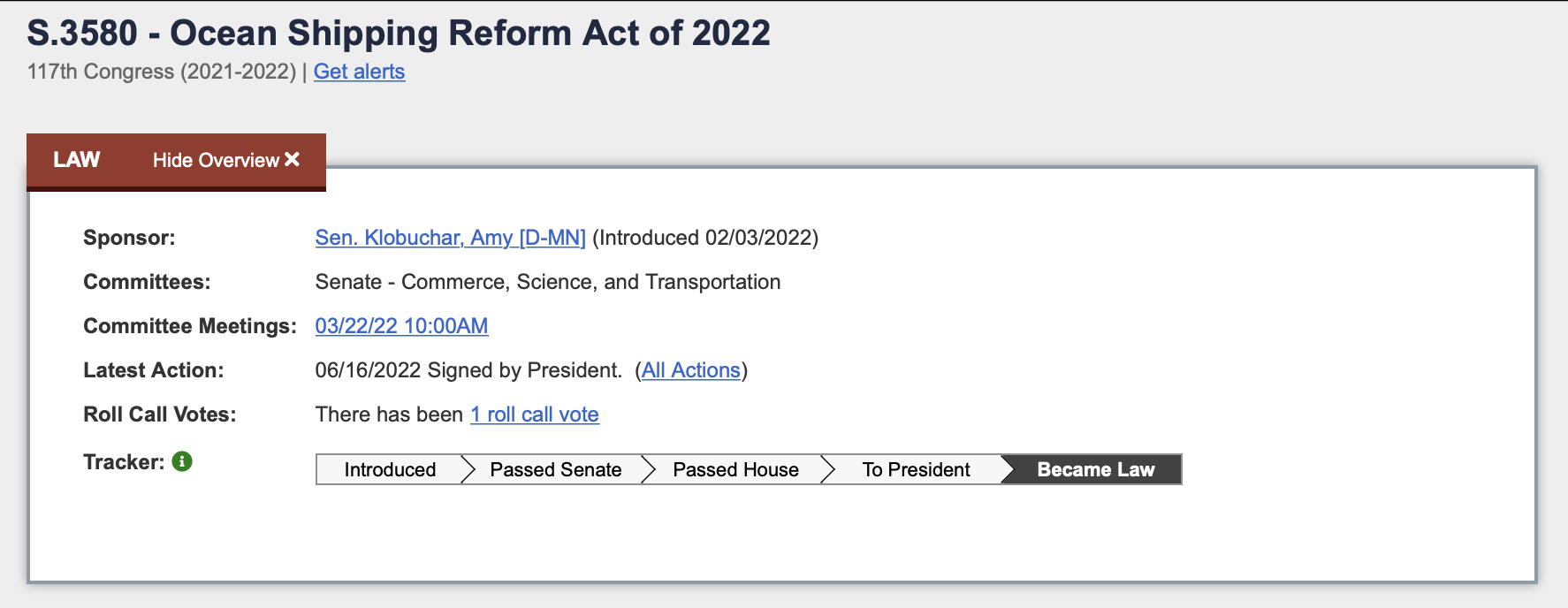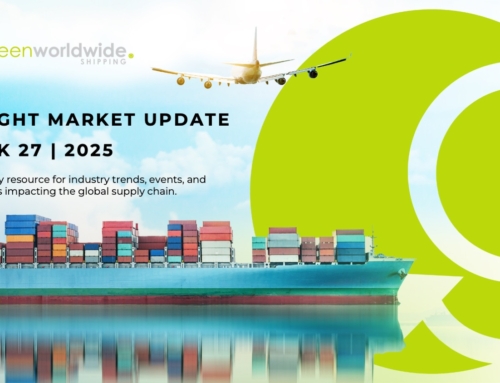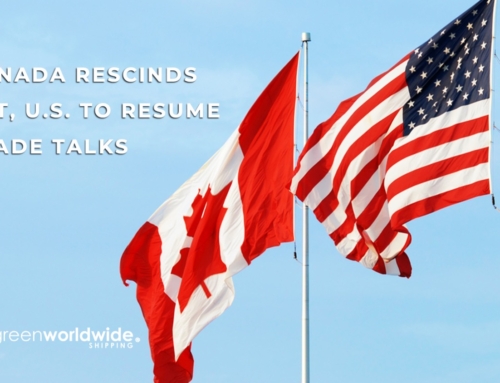UPDATE 6/17/2022: OCEAN SHIPPING REFORM ACT OF 2022 SIGNED INTO LAW ON JUNE 16
United States President Joe Biden signed the Ocean Shipping Reform Act of 2022 (OSRA-22) into law on June 16, 2022.
SUMMARY OF S.3580 OCEAN SHIPPING REFORM ACT OF 2022
This bill revises requirements governing ocean shipping to increase the authority of the Federal Maritime Commission (FMC) to promote the growth and development of U.S. exports through an ocean transportation system that is competitive, efficient, and economical.
For example, the bill requires the FMC to (1) investigate complaints about detention and demurrage charges (i.e., late fees)charged by common ocean carriers, (2) determine whether those charges are reasonable, and (3) order refunds for unreasonable charges.
It also prohibits common ocean carriers, marine terminal operators, or ocean transportation intermediaries from unreasonably refusing cargo space when available or resorting to other unfair or unjustly discriminatory methods.
On Monday, June 13, 2022, the Ocean Shipping Reform Act (OSRA) of 2022 was passed with overwhelming support by the U.S. House of Representatives. Already approved in the Senate, the bipartisan legislation only awaits the President’s signature to become law. The White House released a statement the same evening echoing President Biden’s intention to bring relief to American businesses.
“In my State of the Union address, I called on Congress to address ocean carriers’ high prices and unfair practices because rising ocean shipping costs are a major contributing factor to increased costs for American families. During the pandemic, ocean carriers increased their prices by as much as 1,000%. And, too often, these ocean carriers are refusing to take American exports back to Asia, leaving with empty containers instead. That’s costing farmers and ranchers—and our economy—a lot of money.
This bill will make progress reducing costs for families and ensuring fair treatment for American businesses—including farmers and ranchers. I look forward to signing it into law.”
Statement by President Joe Biden on Congressional Passage of Ocean Shipping Reform Act
15 THINGS SHIPPERS NEED TO KNOW ABOUT OSRA 2022
1. Shipping Exchange Registry
- Summary: The FMC will issue regulations for national shipping exchanges. All shipping exchanges that involve ocean transportation must be registered and regulated by the FMC.
- Deadline: Not later than 3 years after the date of enactment of the Ocean Shipping Reform Act of 2022
2. Prohibition on Retaliation
- Summary: A common carrier, marine terminal operator, or ocean transportation intermediary may not retaliate against a shipper, an agent of a shipper, an ocean transportation intermediary, or a motor carrier by refusing, or threatening to refuse, an otherwise-available cargo space accommodation; or resort to any other unfair or unjustly discriminatory action as retaliation for patronized another carrier; or filing a complaint them; or any other reason.
3. Annual Public Disclosure
- Summary: The FMC will annually publish and update all findings of false detention and demurrage invoice information by common carriers and all penalties imposed or assessed against common carriers.
4. Demurrage, Detention
- Summary: The FMC will initiate a rulemaking further defining prohibited practices by common carriers, marine terminal operators, shippers, and ocean transportation intermediaries regarding the assessment of demurrage or detention charges. The goal is to further clarify reasonable rules and practices related to the assessment of detention and demurrage charges to address the issues identified in the final rule published on May 18, 2020, entitled “Interpretive Rule on Demurrage and Detention Under the Shipping Act” (or successor rule), including a determination of which parties may be appropriately billed for any demurrage, detention, or other similar per container charges.
- Deadline: Not later than 45 days after the date of enactment of this Act. The FMC will issue a final rule not later than 1 year after the date of enactment of this Act.
5. Unfair, Discriminatory Methods
- Summary: The FMC will initiate a rulemaking defining unfair or unjustly discriminatory methods.
- Deadline: Not later than 60 days after the date of enactment of this Act. The FMC will issue a final rule not later than 1 year after the date of enactment of this Act.
6. Refusal to Deal
- Summary: The FMC, in consultation with the Commandant of the United States Coast Guard, will initiate a rulemaking defining unreasonable refusal to deal or negotiate with respect to vessel space.
- Deadline: Not later than 30 days after the date of enactment of this Act. The FMC will issue a final rule not later than 6 months after the date of enactment of this Act.
7. Data Collection
- Summary: The FMC will publish on its website a calendar quarterly report that describes the total import and export tonnage and the total loaded and empty 20-foot equivalent units per vessel (making port in the United States, including any territory or possession of the United States) operated by each ocean common carrier.
8. Dwell Time Statistics
- Summary: Each port, marine terminal operator, and chassis owner or provider with a fleet of over 50 chassis that supply chassis for a fee will submit required data to the FMC to publish statistics relating to the dwell time of equipment used in intermodal transportation at the top 25 ports, including inland ports, by 20-foot equivalent unit, including— (1) total street dwell time, from all causes, of marine containers and marine container chassis; and (2) the average out of service percentage, which shall not be identifiable with any particular port, marine terminal operator, or chassis provider.
- Deadline: Subject to the availability of appropriations, not later than 240 days after the date of enactment of this Act, and not less frequently than monthly thereafter.
9. FMC Investigation and Oversight
- Summary: The FMC establish on the public website of the Commission a webpage that allows for the submission of comments, complaints, concerns, reports of noncompliance, requests for investigation, and requests for alternative dispute resolution.The FMC will maintain an Office of Consumer Affairs and Dispute Resolution Services to provide non-adjudicative ombuds assistance, mediation, facilitation, and arbitration to resolve challenges and disputes involving cargo shipments, household good shipments, and cruises subject to the jurisdiction of the Commission.
- Deadline: Not later than 18 months after the date of enactment of this Act.
10. Emergency Order Authority
- Summary: The FMC will see public comment on (A) whether congestion of the carriage of goods has created an emergency situation of a magnitude such that there exists a substantial, adverse effect on the competitiveness and reliability of the international ocean transportation supply system; (B) whether an emergency order under this section would alleviate such an emergency situation; and (C) the appropriate scope of such an emergency order, if applicable. If granted, the FMC would be allowed to an emergency order requiring any common carrier or marine terminal operator to share directly with relevant shippers, rail carriers, or motor carriers information relating to cargo throughput and availability, in order to ensure the efficient transportation, loading, and unloading of cargo to or from (1) any inland destination or point of origin; (2) any vessel; or (3) any point on a wharf or terminal.
- Deadline: Not later than 60 days after the date of enactment of this Act.
11. Chassis Pool Best Practices
- Summary: Not later than April 1, 2023, the FMC will enter into an agreement with the Transportation Research Board of the National Academies of Sciences, Engineering, and Medicine under which the Transportation Research Board will carry out a study and develop best practices for on-terminal or near-terminal chassis pools that provide service to marine terminal operators, motor carriers, railroads, and other stakeholders that use the chassis pools, with the goal of optimizing supply chain efficiency and effectiveness.
- Deadline: The FMC will publish the best practices developed under this section on a publicly available website by not later than April 1, 2024.
12. CDL License Skills Testing
- Summary: The Federal Motor Carrier Safety Administration will conduct a review of the discretionary waiver authority described in “Waiver for States Concerning Third Party CDL Skills Test Examiners In Response to the COVID–19 Emergency” and dated August 31, 2021, for safety concerns.
- Deadline: Not later than 90 days after the date of enactment of this Act
13. Hazmat Transport Discrimination
- Summary: Comptroller General of the United States will initiate a review of whether there have been any systemic decisions by ocean common carriers to discriminate against maritime transport of qualified hazardous materials by unreasonably denying vessel space accommodations, equipment, or other instrumentalities needed to transport such materials, taking into account any applicable safety and pollution regulations.
- Deadline: Not later than 90 days after the date of enactment of this Act
14. Storage and Transfer of Dwelling Containers
- Summary: The Assistant Secretary for Transportation Policy, in consultation with the Administrator of the Maritime Administration and the Chairperson of the FMC, will convene a meeting to discuss the feasibility of, and strategies for, identifying Federal and non-Federal land, including inland ports, for the purposes of storage and transfer of cargo containers due to port congestion.
- Deadline: Not later than 90 days after the date of enactment of this Act
15. Adoption of Technology at U.S. Ports
- Summary: The Comptroller General of the United States will submit to Congress a report describing the adoption of technology at United States ports, as compared to that adoption at foreign ports, including— (1) the technological capabilities of United States ports, as compared to foreign ports; (2) an assessment of whether the adoption of technology at United States ports could lower the costs of cargo handling; (3) an assessment of regulatory and other barriers to the adoption of technology at United States ports; and (4) an assessment of technology and the workforce.
- Deadline: Not later than 1 year after the date of enactment of this Act
READ THE ORIGINAL CONGRESS.GOV SOURCE: S.3580 OCEAN SHIPPING REFORM ACT OF 2022
As Green continues to monitor the situation, stay up-to-date on freight and trade news by following us on Facebook, Twitter, and LinkedIn.






